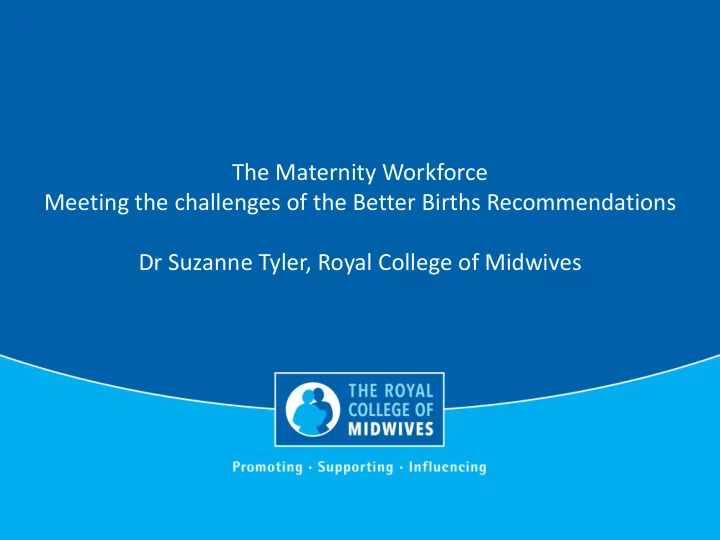

The Maternity Workforce Meeting the challenges of the Better Births Recommendations Dr Suzanne Tyler, Royal College of Midwives
What does Better Births say about workforce? 2 • Staffing levels across the local maternity system have to be adequate otherwise new models will fail • Staff must be empowered and supported to establish their own ways of working • Small teams of midwives need educational support around how to work successfully, how to be supportive, how to challenge, how to reach consensus and how to self-manage • Different approaches to staffing will need to be considered such as greater use of MSWs e.g. at homebirths Maternity staff are central to the experience of maternity care, but also to its safety and effectiveness. Providing health care is by nature demanding and stressful, but the NHS Staff Survey provides evidence that this affects maternity staff more than most. Fewer midwives are satisfied with the quality of their work than the overall NHS workforce. Midwives are more likely to report feeling pressured at work than other NHS staff … The Royal College of Midwives | www.rcm.org.uk
Maternity staffing – levers and challenges 3 • Birthrate Plus • NICE Safe Staffing guidelines • RCM user guide coming soon • National Quality Board guidelines • NHS Improvement Guideline (in development) • National Maternity Review Implementation Board • HEE looking at new roles • Politics is against us • No money • Performance falling • Bigger agendas The Royal College of Midwives | www.rcm.org.uk
What do we see? 4 • 3,500 midwives short • 48% midwives feel stressed almost every day • 65% do not have the time to provide the care they want • 42% HOMS report closing/diverting services • Volunteers to do jobs that MSWs should be doing • Nurses to provide care for IOL and in-patient antenatal care • Midwives routinely doing ventouse • Confusion about doulas – employees or volunteers? The Royal College of Midwives | www.rcm.org.uk
RCM position 5 • We support: • 24/7 support roles in a 24/7 service i.e. clerical staff/porters etc. etc. • properly trained, supported and paid MSWs in a variety of settings • band 6 midwives taking on some additional skills to release medical time e.g. topping up epidurals, suturing episiotomies and tears, examination of the newborn etc • midwives able to work to the full extent of their role • more specialist midwives and consultant midwives • We are against: • removal of student bursaries • the introduction of a Midwifery Associate Role • using midwives to fill gaps in junior doctor rotas • using midwives when there someone more suitable e.g.theatres & HDU • routine introduction of Advanced Practitioner Midwives • routinely moving midwives from one area to meet shortfalls in another The Royal College of Midwives | www.rcm.org.uk
What are we doing to support implementation of Better Births 6 • Campaigning for retention of student bursaries • Being clear about the scope and limits to the role of a midwife • Continuity of carer requires appropriate staffing • Supporting use of BR+ • Assisting with implementation of NICE Safe Staffing Guidelines • Linking staffing to Maternity Review implementation • Caring 4 You campaign • HOMS evidence will inform on-going lobbying • Working with HEE and others to address skills • Labour Ward Leaders Development Programme The Royal College of Midwives | www.rcm.org.uk
Does your unit have sufficient staff, in the right place, with the 7 right skills and attitudes to deliver Better Births? • Safe care • Health professionals that are well trained • Women able to choose the care that is right for them • Form relationships with the professionals caring for them • Good quality and consistent communication • More postnatal care The Royal College of Midwives | www.rcm.org.uk
For further information Website: www.rcm.org.uk Telephone: 0300 303 0444 Email: info@rcm.org.uk www.facebook.com/midwivesRCM @MidwivesRCM
Recommend
More recommend